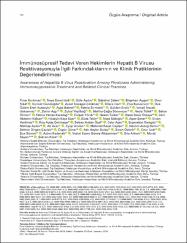Awareness of Hepatitis B Virus Reactivation Among Physicians Administering Immunosuppressive Treatment and Related Clinical Practices

View/
Access
info:eu-repo/semantics/openAccessDate
2019Author
Korkmaz, PınarDemirtürk, Neşe
Aydın, Güle
Çeken, Sabahat
Aygen, Bilgehan
Toka, Onur
Gündoğdu, Kıymet
Kocagül Çelikbaş, Aysel
İnan, Dilara
Kuruüzüm, Ziya
Eren Kutsoylu, Oya Özlem
Batırel, Ayşe
Sırmatel, Fatma
Ersöz, Gülden
Hakyemez, İsmail Necati
Aşçı, Zerrin
Yeşilbağ, Zuhal
Sönmezer, Meliha Çağla
Tülek, Necla
Örmen, Bahar
Yılmaz Karadağ, Fatma
Yörük, Gülşen
Türker, Nesrin
Özkaya, Hacer Deniz
Akdemir Kalkan, İrem
Süer, Hüseyin Kaya
Tekin, Süda
Saltoğlu, Neşe
Şener, Alper
Yenilmez, Ercan
Çetinkaya, Rıza Aytaç
Arslan Özel, Selcan
Ayaz, Celal
Karagöz, Ergenekon
Aydın, Mehtap
Acar, Ali
Arslan, Eyüp
Ceylan, Mehmet Reşat
Aktuğ Demir, Nazlım
Dirgen Çaylak, Selmin
Günal, Özgür
Haykır Solay, Aslı
Öztürk, Sinan
Ural, Onur
Sümer, Şua
Kadanalı, Ayten
Güneş Altıparmak, Vuslat Ecem
Akhan, Sıla
Sayan, Murat
Köse, Şükran
Metadata
Show full item recordAbstract
Objective: This study aimed to evaluate the awareness and knowledge levels of all physicians administering immunosuppressive treatment concerning hepatitis B virus (HBV) reactivation, and draw attention to the importance of the subject through evaluation. Methods: The study was carried out by infectious diseases and clinical microbiology specialists in 37 health centers, and it was performed in Turkey between January and March 2017. All specialists providing a written consent and working in the departments of Medical Oncology, Hematology, Dermatology and Venereology, Physical Medicine and Rehabilitation, and Rheumatology of each study center were included in the study. Results: A total of 430 physicians participated in the study. Their mean age was 39.87 +/- 7.42 years, and 47.9% of them were males. During their career, 39.3% of these physicians had encountered patients developing HBV reactivation while receiving immunosuppressive treatment. The rate of encountering patients who died due to HBV reactivation was 6.5%. 97% of physicians who participated, considered the risk of HBV reactivation to be important. 70.2% of physicians stated that guidelines related to HBV reactivation and antiviral treatment for these patients were discussed in the congresses they participated, regarding their specialties. The rate of performing hepatitis screening among physicians whose patients developed HBV reactivation was statistically significantly higher than those physicians who had no patients with HBV reactivation (p<0.05). Physicians who used the guidelines related to HBV reactivation in their specialties performed screening for the HBV infection much more often than physicians who did not use the guidelines (p=0.002). Conclusions: According to the results obtained in our study, the rates of conducting screening and awareness of HBV reactivation among physicians administering immunosuppressive treatment were higher compared with similar studies; however, their awareness that HBV DNA and anti-HBc should be utilized much more frequently among the serological tests they use for screening of HBV infection, should be increased.















